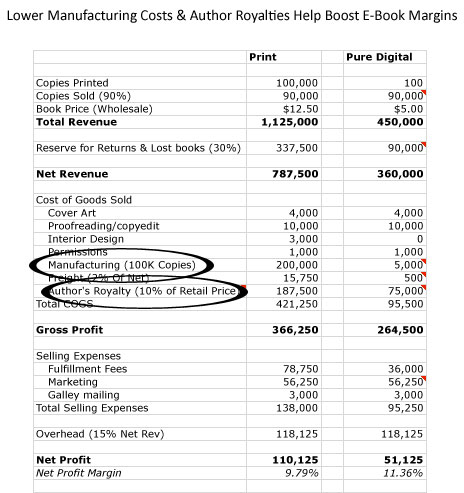Amazon loses $ 2 on each e-book
It's amazing how strange the e-book market works. Buyers complain that books are too expensive, and publishers are unhappy with their cheapness. But it turns out that online stores earn almost nothing. As it turned out, the same Amazon loses $ 2 on every e-book sold. The fact is that Amazon sells most of the books for the Kindle "reader" at a single rate of ten dollars, and publishers receive $ 12 and at the same time are still unhappy that the electronic version brings less money than the paper version.
It is still not clear whether the electronic publishing house will be on its feet and in what form, but Amazon pays for its popularization from its own pocket. Of course, this is done not for the sake of charity, but to capture the market.
At the same time, there are rumors that e-books will soon be on sale on iTunes, and then Amazon will have difficulty.
Amazon currently controls half of the US e-book market. Theoretically, this market has good prospects, because the profile of book readers normally coincides with the profile of fans of electronic gadgets: a relatively young audience (two thirds of book buyers are under 55 years old), well educated, with high incomes.
')
According to analysts, with the transition to electronic distribution, book publishers will have to change business models. Most importantly, they should cut prices (the normal price for an e-book is $ 5, not $ 10-12), so price wars are inevitable. If someone manages to sell e-books for $ 10 apiece, you will get super-profit.
With a complete rejection of paper printing, the profitability of the publishing business may even increase, although the total income will fall (see the table comparing business models). Author fees will be reduced, which are tied to the retail price. These are the prospects that are not very bright for publishers and writers.

Worst of all, that the ideal model with a one hundred percent transition to electronic publishing (as in the table) is unlikely to materialize in the foreseeable future. That is, book publishers may fall into the same trap as the newspaper / magazine business, namely: they will not be able to abandon the paper, and they will have to bear all the costs associated with printing, while the audience will gradually go online. It turns out that the print run falls and brings less money, and printing costs remain large, and it is almost impossible to correct the situation until 100% of the audience goes online.
It is still not clear whether the electronic publishing house will be on its feet and in what form, but Amazon pays for its popularization from its own pocket. Of course, this is done not for the sake of charity, but to capture the market.
At the same time, there are rumors that e-books will soon be on sale on iTunes, and then Amazon will have difficulty.
Amazon currently controls half of the US e-book market. Theoretically, this market has good prospects, because the profile of book readers normally coincides with the profile of fans of electronic gadgets: a relatively young audience (two thirds of book buyers are under 55 years old), well educated, with high incomes.
')
According to analysts, with the transition to electronic distribution, book publishers will have to change business models. Most importantly, they should cut prices (the normal price for an e-book is $ 5, not $ 10-12), so price wars are inevitable. If someone manages to sell e-books for $ 10 apiece, you will get super-profit.
With a complete rejection of paper printing, the profitability of the publishing business may even increase, although the total income will fall (see the table comparing business models). Author fees will be reduced, which are tied to the retail price. These are the prospects that are not very bright for publishers and writers.

Worst of all, that the ideal model with a one hundred percent transition to electronic publishing (as in the table) is unlikely to materialize in the foreseeable future. That is, book publishers may fall into the same trap as the newspaper / magazine business, namely: they will not be able to abandon the paper, and they will have to bear all the costs associated with printing, while the audience will gradually go online. It turns out that the print run falls and brings less money, and printing costs remain large, and it is almost impossible to correct the situation until 100% of the audience goes online.
Source: https://habr.com/ru/post/77724/
All Articles